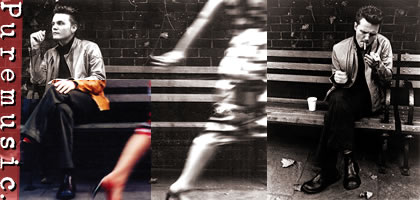
A Conversation with David Mead (continued)
PM: Thanks, that kind of catches us up, and we'll continue in present time.
So that's such a special voice that you have--first of all, I mean, you sing, obviously, very high, which stands you apart from most singers. Your falsetto voice is so strong and so controlled. Has it always been that way? Has it always been a huge feature of how you sing?
DM: It has been for a while now, but it wasn't always. I think I sort of learned to sing singing along with the first Jeff Buckley record, which I discovered, I guess, like back in '93, just a little EP he put out. And I'd really never heard a man who had that level of control. And it just went from there.
PM: Of course, his dad [Tim Buckley] was a remarkable singer as well.
DM: Absolutely.
PM: Yeah.
DM: But I think the turning point was that I figured out how he did it. And it's actually a much more economical way of singing. At the end of the day it's a lot less taxing than trying to shout. So yeah, I think that's probably when it changed.
PM: Wow, interesting. Yeah, because listening to Jeff Buckley might inspire one to work on that part of one's range and that kind of approach.
DM: Definitely.
PM: Including your falsetto, since it's so usable and so under control in your case, how big is your vocal range, would you say?
DM: I think it's four octaves, Frank.
PM: Because that's what it sounds like to me, brother man. It sounds like four.
DM: I haven't tested that out in a while. I knew that Jeff Buckley had a four octave range, and that was always my goal. I was a lot more concerned about it at one point than I am now.
[laughter]
DM: But the only curse of having that range is the tendency to want to write songs that use the entire thing, which is good on some levels, but--
PM: Exactly my next question.
DM: --being that I kind of write pop songs, it's always--you can kind of cut down on the singability of them, too, without meaning to.
PM: Exactly where I'm going. I think that the range and your control of it must've influenced your songwriting greatly, because at some level, one is writing to showcase one's talents, and also working within one's limits. But when your limits are pretty extensive, you're tempted, as you say, to write to the limits, and yet that's not necessarily the way you get your best pop song out.
DM: Yeah. It'd be one thing if I were writing arias--
PM: [laughs]
DM: --but I'm not nearly that good.
PM: Yes, that'd be a good arena for writing to the limits. But that said, your melodies are something truly extraordinary. I mean, I love the melodies of Ron Sexsmith [see our early interview with Ron and a review of his latest release], but you write great melodies that few people could sing well.
DM: Well, thanks.
PM: And great background vocals, too. I mean, the ones on "Bucket of Girls," for instance, are fantastic, Rufus-esque.
DM: Yeah, right, right. That song was definitely influenced by Rufus, for sure. [see our interview with Rufus Wainwright from a few issues back]
PM: And as influenced as a lot of us would like to be by him, I mean, I could actually hear it there, and that's a real trick. It's beautifully done.
DM: Thank you.
PM: So you mentioned your wife, but we'd like to talk about her. Why don't you tell us about Natalie, whose artwork adorns the new record, where and how you met and all that?
DM: Well, we actually met at 12th and Porter in Nashville.
PM: How seedy.
DM: Yeah, I know.
PM: [laughs]
DM: It's kind of cool: after all these years of hanging out in bars and trying to meet girls, I actually met my wife in one.
PM: That's beautiful.
DM: But yeah, it was kind of an unremarkable way to meet. But we had a couple of dates, and then I had to go--hey, Frank?
PM: Yeah.
DM: I don't know what the deal is with this cell phone. I'm going to call you back on my home line. This is just really annoying.
PM: Yeah, it's starting to get fuzzy.
DM: I'll call you right back.
PM: Great, yeah, because it would never do to get fuzzy right when you start talking about your wife.
DM: [laughs] That wouldn't be right.
[He calls back and we resume.] So yeah, Natalie and I had a couple dates, then I had to go to England for a month to finish that other record. So we had a long distance courtship for a little while and then it kicked into higher gear when I got back, and here we are.
PM: Natalie's artwork is beautiful on the record. Well-chosen, and it really casts a mood.
DM: Thanks, I'll tell her you said so. continue
print (pdf) listen to clips puremusic home